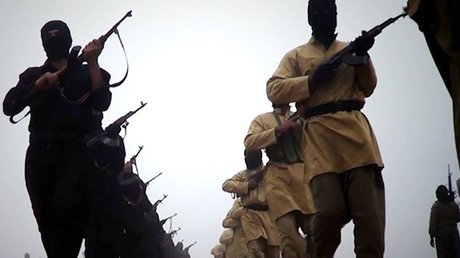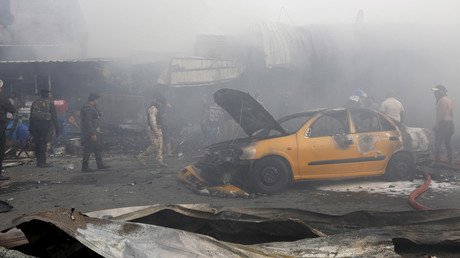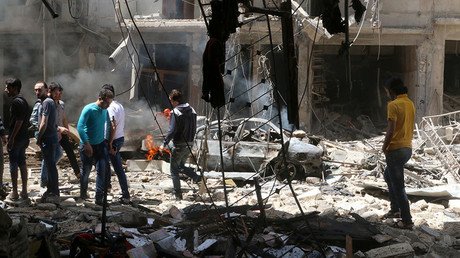Future global order depends on big powers’ effective cooperation – ex-Australian PM Rudd to RT
Maintaining stability and order amid the shift of the “global geo-economic gravity” to Asia can only work if leading world powers, such as the US, China and Russia, work on emerging issues in close cooperation, according to the former Australian PM, Kevin Rudd.
“If you manage to have a system in which the global great powers, like Russia, like the US, like China are working effectively together then the rest of the global order functions well.
When they are not working effectively together, you begin to see evidence that the order does not work as well as it should,” Rudd told RT in an exclusive interview.
He praised the regular cooperation which Russian Foreign Minister Sergey Lavrov shares with US Secretary of State John Kerry, particularly concerning the Syrian crisis and ongoing negotiations over the political transition process.
“Lavrov and Kerry are in regular engagement with each other on the details on the ground [in Syria]. Although it’s difficult and complex, it’s hard security [and] diplomatic work, I would encourage Lavrov and Kerry to [continue their work together]. It is fundamentally important, particularly for the suffering Syrian people,” Rudd said, emphasizing that it is critical that work aimed at solving the Syrian crisis continues.
There is indeed no real ‘Plan B’ for Syria, the UN’s special envoy to the embattled country Staffan de Mistura personally acknowledged in an interview with RT, adding that the ceasefire and international peace talks were "a small, but a very special miracle ... created by a high level discussion between the Russian Federation and the USA."
Kevin Rudd, who has headed the Australian government twice, claims that in order to pacify the conflict in this Middle Eastern country, political transition will not be quite enough. As a skilled economist who successfully led his country through the global financial crisis of 2008, Rudd says it’s crucial to help develop a strong Syrian economy, as well as the economies of other Middle Eastern states, where extremist militant organizations draft supporters.
“Unless you have social stability and economic opportunity, the forces and the appeal of national jihadism can become much more widespread.
One of the big challenges [is to] develop the economies of the Middle East, the economies of the Arab world, to grow jobs for young people, young men in particular across the Arab States,” Rudd stresses, adding that this measure will give young Arab men a chance at a provided existence, so they will not join extremist organizations in search of a better life.
Speaking of the threat of terrorism, the former Prime Minister stresses that no matter where terrorists strike, they strike at the basic values of the entire global community and therefore he once against emphasizes the importance of combined action against the common threat.
“The global challenge we’re all facing is the challenge of global militant jihadism. Wherever its manifest – whether it’s terrorist attacks in Russia, terrorist attacks in Beslan, terrorist attacks in New York, Brussels, Paris – wherever – this is a common assault on all of our values, all of our interests.
Combined actions to deal with Islamic State (IS, formerly ISIS/ISIL) threat is critical. All of us have a long way to go to ensure that this threat – to all of us – is brought back under control.”
Rudd currently heads the Asia Society Policy Institute focusing on research in Eastern policy and the economy. Speaking of the future of the global economy, the Former PM predicted that China would take the lead among the world’s largest economies sometime within the next 10-15 years, which, in his words, will lead to a significant shift in the global state of affairs.
“When China becomes the world’s largest economy […] this will be the first time in a couple of hundred years that a non-western country will be the largest economy in the world. Anyone who thinks that this will not influence the broader global questions is fooling themselves.
We see a move of the global geo-economic gravity to Asia. Therefore I think it’s important for us to think through carefully what that means for the global order, the UN, the IMF and other systems.”
Despite the vague prediction, Rudd welcomes China as an emerging leading economy, stating that the global community needs those who can push it forward.
“We are looking for drivers of the global growth and until we [find them] we will have very flat economic opportunities. [There] is work in progress on reforming global financial institutions] to make sure they don’t carry the systemic risk of the past.
Yet… the EU is not in a good economic, political shape, North American economy is recovering…
We still have a lot of work to be done,” he says.
Often viewed as a key figure in the development of the G20 group of leading world powers, and mentioned as a potential candidate for UN Secretary General, Kevin Rudd however noted that despite his strong support for the United Nations as a governing body, he cannot help but notice its failures in overcoming recent crises.
“I’m a strong supporter of the UN system and always have been. But I think if we want to be realistic about it we have to look at some areas where the UN has been ‘missing in action.’
“[E.g.] recently successfully concluded Iranian nuclear negotiations… Surprisingly, at those negotiations the UN was not at the table, having a [responsibility for peace and security under the UN charter]…
“Whether it’s terrorism or dealing with asylum seekers and refugees, or in key questions of nuclear proliferation, whether in Iran or North Korea, we need a much stronger UN role in the future,”















